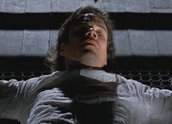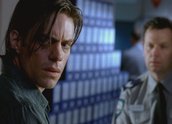


The Book of Revelation (2006)
Synopsis
Daniel (Tom Long) and Bridget (Anna Torv) are the stars of a modern dance company, run by Isabel (Greta Scacchi). During rehearsals for a new show, Daniel goes out to buy cigarettes for Bridget and disappears. He returns 12 days later, traumatised and unable to tell Bridget, with whom he lives, what has happened. A series of visions, or flashbacks, slowly reveal the story.
Daniel has been abducted and drugged by three masked women. They chain him to the floor and subject him to a series of sexual assaults, culminating in anal rape. His penis is mutilated and he is forced to dance for them, as their final demand, before they release him. Daniel leaves his home and the dance company, unable to resume his former life. He takes a job in a waterfront hotel and begins searching for women with the same distinguishing marks on their bodies.
Isabel asks her former husband Mark (Colin Friels), a policeman working with victims of sexual assault, to track down her protégé. Mark finds Daniel, emaciated and withdrawn, at the pub. Indirectly, he divulges that Isabel is seriously ill. Daniel visits her but he cannot talk about what happened, or resume his dancing. He returns to his search, concentrating on hospitals, because the women knew how to administer injections. On a train, he meets a young woman. A friendship begins with Julie (Deborah Mailman) and Daniel begins to dance again, and to work at becoming a choreographer. They go to a nightclub where Daniel recognises a woman with the precise hair colour of one of his abductors. He attacks her, then realises she is not one of the masked women. In jail, awaiting charges, Daniel finally begins to talk to Mark, the policeman.
Curator’s notes
The Book of Revelation is based on a simple, powerful idea: most films about rape are about women as victims of men, so reversing that idea allows men to experience the trauma of violation. That is what the film is really about – trauma, rather than the reasons why these attacks might occur. Neither the film nor the book on which it is based, by English novelist Rupert Thomson, explains who the women are, or why they decide to abduct the dancer. They are, in a sense, phantoms. In the adaptation, director Ana Kokkinos goes further than the novelist in suggesting a variety of motives, but these are no more than suggestions, partly in order to flesh out the film’s characterisation and ideas. Like her previous films, Head On (1998) and Only the Brave (1994), The Book of Revelation is an explosive mixture of elements – highly controversial and confronting subject matter, matched by a willingness to depict sexual content more frankly and disturbingly than her contemporaries in Australian cinema.
At the same time, the film is driven more by ideas than a desire to shock. There is a strong streak of iconoclasm in Kokkinos’s work, but it’s concentrated in the form of her films, as much as her content. The reversal of rape victimisation is an example. It re-energises the way in which the filmmaker can tell her story and the way an audience can experience it. A frequent comment by Australian critics, when the film opened in 2006, was that many had never seen a story like this before. Many people had a similar reaction to Head On (1998), an extraordinary film about one long night in the life of a young bisexual Greek man in Melbourne.
Head On was expressed as a drug and alcohol-induced delirium, a search for obliteration. The Book of Revelation is a much cooler film, but also couched as a series of dreams, or rather nightmares. Kokkinos uses long blackouts between scenes and ellipses in time to keep us inside Daniel’s shifting consciousness, but the film has an almost architectural precision. That adds to the creepiness and the sense of his isolation after he’s been raped. Head On was wildly sensual, full of Greek dancing and singing as well as desperate sexual encounters. The Book of Revelation has no such cultural joy.
Daniel’s life has been destroyed for no reason that he can divine – except perhaps that his beauty as a dancer attracted attention. The damage is then amplified by his inability to express his rage, guilt and especially his confusion over his body’s unwilling participation. The character is a dancer in order to emphasise that physical beauty; he’s well known because of his ability to control and move his body. All that is taken away from him by a situation that is a deliberate mockery of a male sexual fantasy. Being raped by three women turns out to be no fun after all, despite the mirth of the policemen, when he tries to report the crime (clip three).
The novel was set in Amsterdam, partly because of that city’s sinful reputation. Working again with playwright and screenwriter Andrew Bovell (who co-wrote Head On), Kokkinos relocated the story to Melbourne – where all of her films have been set. Her films so far have a distinctly European feel, despite that Melbourne setting. That’s partly because she is an unashamedly artistic filmmaker, drawing inspiration from European models of cinema, rather than Hollywood. Her films are more formally adventurous and self-conscious than most of her contemporaries, and more difficult to finance. Head On was made in 1998; it took another seven years to get The Book of Revelation into production.
Both films feature a remarkable central performance – Alex Dimitriades in Head On (1998), and Tom Long here. Both films are about young men on the edge of a precipice; both present a very confrontational sexuality that’s anything but pleasurable, for the character or the audience. Beyond that, they have very different trajectories – Ari in Head On (1998) is trying almost to lose himself, but Daniel is trying to find his way back. Both films are major achievements.
The Book of Revelation was released in Australian cinemas on 7 September 2006.
- Overview
- Curator’s notes
- Video 3 clips
- Principal credits
- Find a copy
- Make a comment
- Map
- Add your review



